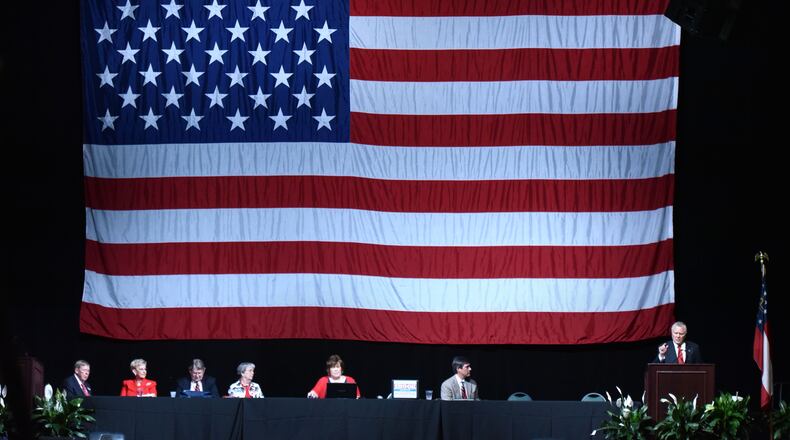This weekend's two-day convention of the Georgia Republican party in Augusta could be called the first GOP gathering of the post-Nathan Deal era.
Yes, Deal has 31 months left to serve, and a long bucket list, besides. But this will be the first time since Republicans came to power in 2003 that a sitting governor won’t address his party’s ruling body.
Deal’s excuse is a previous engagement — a Governor’s Mansion reception for the state’s top high school students.
But Augusta also holds the certainty of a grassroots rebuke of Deal for his veto of two bills, including a “religious liberty” measure intended to shield religious conservatives from the aftereffects of the U.S. Supreme Court decision legalizing same-sex marriage.
Regardless of the motivation, Deal’s absence will be felt. In the rhetorical hothouse of GOP conventions, it has become the task of governors to remind the state’s most fervent Republicans that power and responsibility travel hand-in-hand. “We cannot sacrifice good, conservative government and effective leadership to mantras and attack ads from our own,” lectured Deal’s predecessor, Sonny Perdue, at the 2009 convention.
That sort of brake, which Deal has himself has tapped, will be missing on Friday and Saturday, during a session that could go a long way toward determining the future of the GOP in the South.
A line is already forming between Republicans who think Trump represents a fundamental shift in GOP thought, and those who think the New York billionaire is simply leasing the Republican brand — which can be reclaimed on Nov. 9, after he’s done with it.
In the former camp we must now place U.S. Sen. David Perdue, who is scheduled to address the convention on Saturday. On Wednesday, Perdue penned a Washington Post op-ed piece extolling Trump's candidacy.
“Mr. Trump’s nabbing of the presidential nod embodies a dramatic shift in the political paradigm. Many voters are now more motivated by their frustration with Washington than their ideology,” the senator wrote. “As I’ve said all along, this movement is bigger than party or ideology, or even, dare I say, Trump himself.”
Republicans in Augusta are likely to press Perdue to expound on that theme.
Another area where this split is likely to show itself is in the main business of the convention — the selection of the final delegates to the Republican National Convention in Cleveland next month. With Trump now over the top in the delegate votes he needs to secure his nomination on a first ballot, the heat of the contest has subsided, but is still likely to be dominated by Georgia Republicans concerned with what their party will look like after Trump.
And after Nathan Deal.
At this weekend’s Deal-less convention, no one is likely to benefit more than Lt. Gov. Casey Cagle. Given that House Speaker David Ralston also intends to give Augusta a miss, Cagle will be the ranking state Capitol representative on the stage.
And he’ll have the highest profile of any potential 2018 Republican candidate for governor. (U.S. Rep. Lynn Westmoreland of Coweta County, also mentioned as successor to Deal, will attend the convention, but won’t have a speaking role.)
You can put the lieutenant governor in the restoration wing of the current GOP debate, among those who would like to see religious conservatives returned to a position of dominance within the Republican party — in Georgia and elsewhere.
Throughout much of his state Capitol career, Cagle has been the go-to guy for business interests in Georgia. And in the 2016 session, the state Senate — over which the lieutenant governor presides — indeed passed a compromise MARTA bill that could allow the transit agency to expand rail service within the city of Atlanta. That was a high-priority win for the chamber crowd.
But Cagle also spent the 2016 session positioning himself as the champion of Christian conservatives in the Capitol. He became a major force behind HB 757, the "religious liberty" measure ultimately vetoed by Deal.
There’s a backstory here. Cagle was first elected lieutenant governor in 2006, after winning an upset primary victory over Ralph Reed, founder of the Faith and Freedom Coalition. Ten years later, as Cagle prepares to move one rung up the ladder, a rapprochement was called for.
Among the groups that Cagle worked closely with in pushing HB 757 this year: The Faith and Freedom Coalition of Georgia. “His office and the speaker’s office worked out the compromise language. So Casey’s been strong on religious liberty issues,” confirmed David Baker, executive director of the FFC’s Georgia chapter.
In a debate over whether the Republican party should return to its default setting after this year’s Trump adventure, Baker’s position should surprise no one. “Religious conservatives and others are looking for candidates who support traditional Republican values. And those include being pro-life, pro-family, [and] pro-religious liberty,” he said.
As for Cagle, his balancing act isn’t just the tightrope between the state’s business interests and religious conservatives. As governor, Nathan Deal will pass judgment on bills generated during two more sessions of the General Assembly. Including the agenda that Cagle could use to seek a promotion two years hence.
The lieutenant governor isn’t a fellow who seeks out unnecessary confrontations. But an absent governor may give Cagle a chance to make a broader play for a faction that he’s betting will be around long after Trump and Deal aren’t.
About the Author
The Latest
Featured




